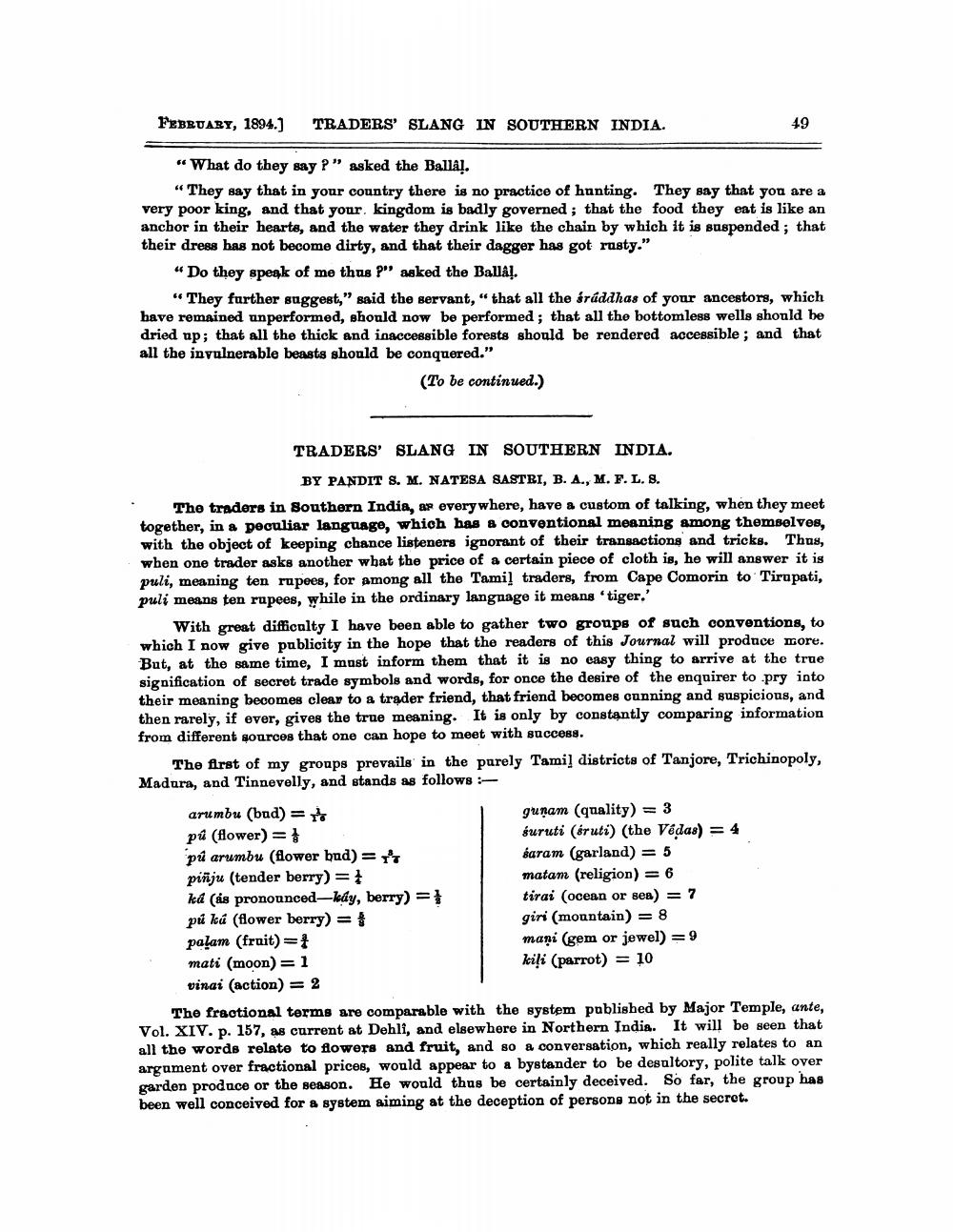________________
FEBRUARY, 1894.)
TRADERS' SLANG IN SOUTHERN INDIA.
“What do they say P" asked the Balla!.
“They say that in your country there is no practice of hunting. They say that you are a very poor king, and that your kingdom is badly governed ; that the food they eat is like an anchor in their hearts, and the water they drink like the chain by which it is suspended ; that their dress has not become dirty, and that their dagger has got rusty."
“Do they speak of me thus p" asked the BallA.
“They further suggest," said the servant," that all the śráddhas of your ancestors, which have remained unperformed, should now be performed; that all the bottomless wells shonld be dried up; that all the thick and inaccessible forests should be rendered accessible; and that all the invulnerable beasts should be conquered."
(To be continued.)
TRADERS' SLANG IN SOUTHERN INDIA.
BY PANDIT 8. M. NATESA SASTRI, B. A., M. F.L.S. The tradors in Southern India, ar everywhere, have a custom of talking, when they meet together, in a poculiar language, which has a conventional meaning among themselves, with the object of keeping chance listeners ignorant of their transactions and tricks. Thus, when one trader asks another what the price of a certain piece of cloth is, he will answer it is puli, meaning ten rupees, for among all the Tamil traders, from Cape Comorin to Tirupati, puli means ten rupees, while in the ordinary langnage it means "tiger.'
With great difficulty I have been able to gather two groups of such conventions, to which I now give publicity in the hope that the readers of this Journal will produce more. But, at the same time, I must inform them that it is no easy thing to arrive at the true signification of secret trade symbols and words, for once the desire of the enquirer to pry into their meaning becomes clear to a trader friend, that friend becomes cunning and suspicious, and then rarely, if ever, gives the true meaning. It is only by constantly comparing information from different sources that one can hope to meet with success.
The first of my groups prevails in the purely Tamil districts of Tanjore, Trichinopoly, Madura, and Tinnevelly, and stands as follows :
arumbu (bud) = x
gunam (quality) = 3 pú (flower) =
suruti (sruti) (the Vedas) = 4 pú erumbu (flower bud) = 1
saram (garland) = 5 piñju (tender berry) = ?
matam (religion) = 6 kd (is pronounced-ledy, berry) = ?
tirai (ocean or sea) = 7 pú kú (flower berry) =
giri (mountain) = 8 palam (fruit)=+
mani (gem or jewel) = 9 mati (moon)=1
kili (parrot) = 10 vinai (action) = 2
The fractional terms are comparable with the system published by Major Temple, ante, Vol. XIV. p. 157, as current at Dehli, and elsewhere in Northern India. It will be seen that all the words relate to flowers and fruit, and so a conversation, which really relates to an argument over fractional prices, would appear to a bystander to be desaltory, polite talk over garden produce or the season. He would thus be certainly deceived. So far, the group has been well conceived for a system aiming at the deception of persons not in the secret.




